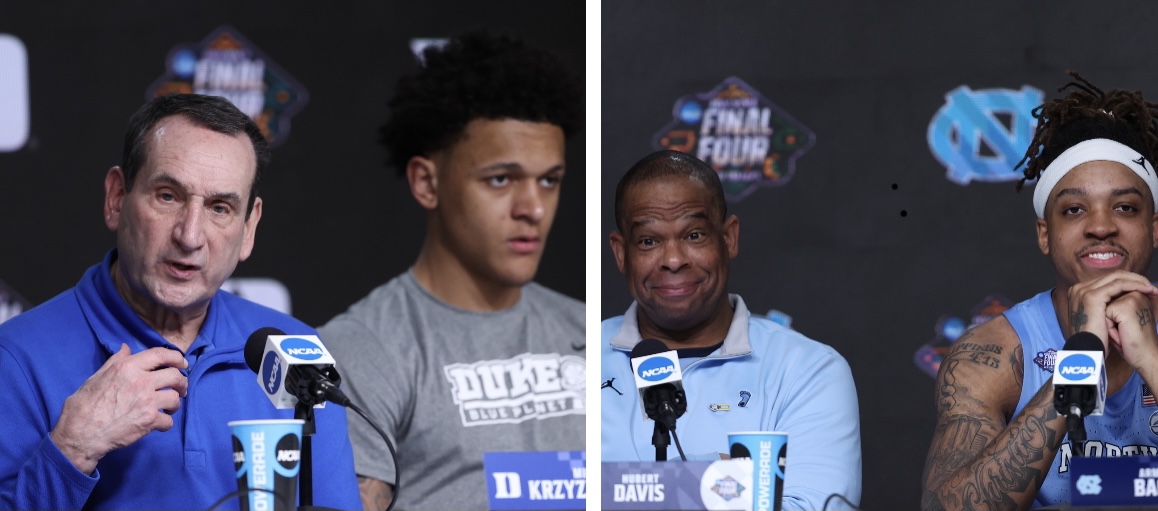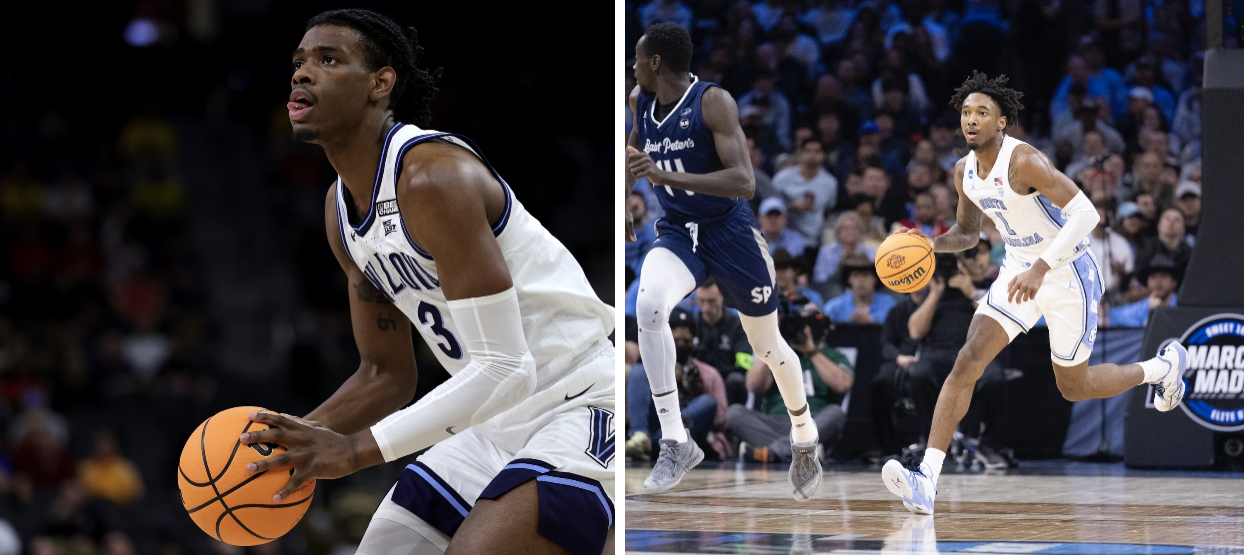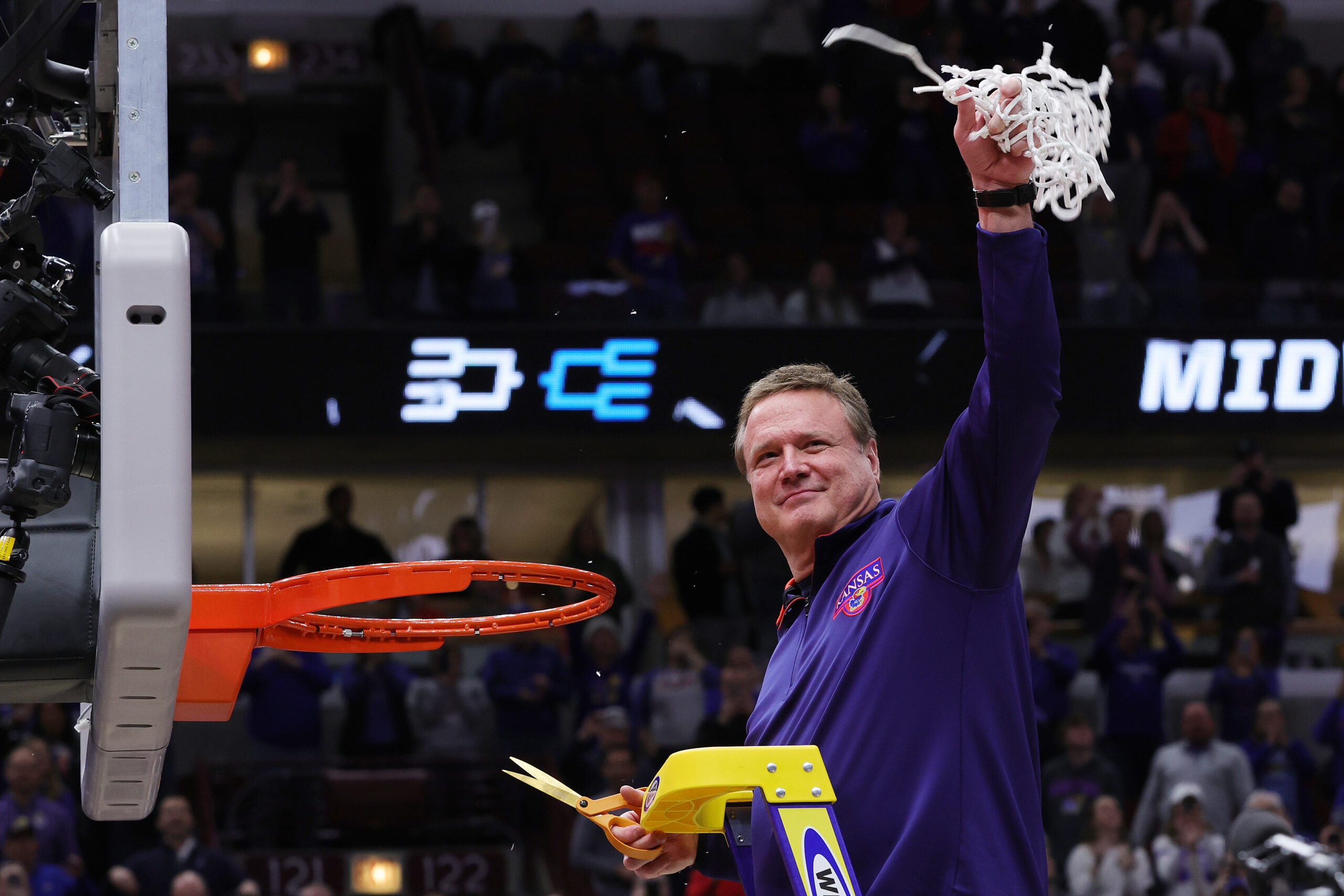“March Madness” gets a lot of burn in the media, in heated barbershop debates and in the casual office-water-cooler jabber. It’s a term that was born in ’83 when major underdog N.C. State and its vivacious coach, Jim Valvano, caught wreck on the basketball world by winning a destiny–driven series of nine overtime and one-point games, becoming the first all-black starting five to win the ACC Tournament and National Championship.
The Cinderella Wolfpack won the final game against the heavily favored, dunk-crazy, rim-raising Phi Slama Jama on a miraculous flush by forward Lorenzo Charles, off a desperate heave by guard Dereck Whittenburg, as the clock expired. That play is the everlasting symbol of NCAA March Madness, a tournament rooted in the real possibility of accomplishing the impossible.
Approaching the 30th anniversary of the championship, it was Whittenburg’s idea to make a documentary about that run. He hooked up with ESPN and the result is “Survive and Advance,” the latest in its “30-for-30” documentary series.
The Shadow League interviewed Whittenburg about the film and the ’83 season.
What made you reach out to eight-time Emmy-award winner Jonathan Hock to direct the docu-film?
It was an idea that I came up with when I left coaching. I was watching The Fab Five film and I thought, why not our story? It’s a story about a team that came from nowhere. About a bunch of guys from all over the country, led by a charismatic coach, who really accomplished an improbable season. It was a David and Goliath story. We won the National Championship and beat all of these great players. Nobody thought we’d even be contenders. The dramatic fashion we won in, created the slogan “March Madness.”
Does that ’83 NCAA Championship still have the same impact on your life?
It’s a story that resonates in people’s minds even 30 years later. I still speak to people who saw the game and they always want to tell me where they were and what they were doing and what occurred. It’s been a tremendous impact just because we did something and achieved something we dreamed about. It was a vision for us because it wasn’t impossible. It was done before, in 1974 by N.C. State and my cousin, David Thompson who is one of the greatest college players ever and an NBA Top 50 all-time great. In sports, when great moments happen, some of them stick in your mind and they live forever. Some go away. This particular moment has grown over time and the film will only extend its life. People remember ’83 because it was one of those special moments that nobody saw coming.
What makes this story different from other underdog stories?
The story lines within the story are incredible. You have Jim Valvano, this Italian coach from Long Island, New York, who came down to the south to coach. In those days, that wasn’t an easy deal. He was the first coach to have an all-black starting five and win the ACC Tournament. That was not necessarily that popular at the time. Nobody wanted to talk about it and nobody wants to tell that part of the story, but, in reality, it’s as historical as our accomplishments on the court. If you talk to the fans at the time, Valvano coming down south and accomplishing what he did was a significant moment.
What coaching methods did Valvano use for motivation during that championship run?
He had the personality, charisma, the passion and the energy and the ability to motivate people to play beyond themselves. He made us believe in a vision and more importantly believe in ourselves. In turn, we didn’t want to disappoint him and we played harder for him than we played for ourselves.
How did Jim Valvano influence the lives of his players? Tell me a funny anecdote involving him.
For one thing, he was a dreamer. He believed in us as people and students. He taught us as much about life as basketball. He had a vision and a dream from day-one that we’d win a National Championship, but we were also going to be good students and people as we grow old.
I was a sophomore sitting in the front row the first day he stepped on campus for his press conference. I had a brief case. He looked at me and said, ‘Whittenburg! That’s what I’m looking for. He’s got a brief case. He’s about education.’ He said he would look at us in three different ways: as a person, as a student and as basketball players third. He predicted a National Championship for us. He also said we’re going to be student-athletes.
The last time he had met me was in the Boston Shootout when I was in high school. Back then, there was only one postseason tournament. Sidney (Lowe) and I were on the same high school team at DeMatha Catholic. We played on this AAU team called the Washington DC Stars, which played the New York Stars. We beat them in triple overtime. Valvano was coaching at Iona at the time and he comes over grabs us and says, ‘I love you two.’ We didn’t know who he was. He introduced himself as Jim Valvano, Iona College.
The funny story about that is that when I saw him at the press conference, I leaned over to an assistant coach and told them the new coach was Jim Valvano, he owns a college. The coached looked at me and said, ‘No. He doesn’t “own-a-college.” He coached at I-O-N-A College.’ So I got that story mixed up about who he really was when I met him.
Were you fearful of any of the perennial powerhouses you faced along the way?
Well, as you can hear from my voice I fear no one, first of all, as a person. Secondly, I think that playing in the best conference in the country (ACC) night-in and night-out and facing teams of that caliber makes you impenetrable to fear. We respected our opponents, but didn’t fear them.
What do you remember about that game-winning play? NCAA lore says it was a pass.
(Laughter) If it’s a pass, I’m sticking to it, but what I remember about the play the most was that we called a time-out with 44 seconds to go. We drew up what we call “The Five Play,” where Thurl Bailey runs into the corner and I would come up for a one-on-one on the right side. What happened was, when we inbound the ball, Houston comes out in a 1-3-1 trap and we weren’t expecting that, so it kind of threw us off a little bit. It didn’t change much for us, though. We were still going to pass the ball around and take the final shot. We understood that from endlessly practicing last second situations that they call “time and score.”
How has basketball changed from that golden era?
That ’79 class was unbelievable. The talent wasn’t as diluted. The rivalries and the games were better because guys stayed in school at least three years. The college experience meant something. Dominique Wilkins, James Worthy and Isiah Thomas were the only guys from that class to leave early. Thomas won the National Championship as a sophomore and was so unbelievably talented, he had to go.
In the Golden Age, competition in college was sacred. Going to college was a privilege. Guys embraced the fact that college was a necessary means. Education meant something. Camaraderie and team meant something. College was so much more important. If you compare it to today, now, most kids think college is a stepping-stone to go to the NBA. And what’s unfortunate about that is they are missing the college experience.
Was playing in the ACC, or your controversial coaching stints at Wagner and Fordham, more challenging?
Coaching was way harder. Being a head coach is like being the CEO of a company. He runs the practices, then, he goes out and puts a suit on for the game. You have to deal with fundraising, organizing your staff; you have a budget, and you have to recruit. If you look at a coach’s responsibility in college, coaching the game is the thing he’s actually spending the least amount of time doing. At eight o’clock in the morning, you have to deal with study hall, then meet with administration and staff and player problems.
It’s a lot of responsibility. What people don’t understand is that, traditionally, it’s a position of leadership more than anything. You’re hiring a person that hopefully you think is a right fit to handle all of the responsibilities of a coach, and can coach too. A university isn’t hiring a coach to just win games and hoping he is a fit with everything else. We’ve lost our way in college in that regard. Schools are hiring coaches because their mentality has become a win-at-all-costs one. Let’s hire anybody who we think can win us games to make our university look good. Forget about his character. Forget about what he does off the court and how he leads his players. But everything counts. You shouldn’t compromise anything. The kids still have to be good student–athletes. They still have to have good character and you have to win. You can’t compromise any aspect of college basketball.
Did you have any more pressure to win as a coach because of your success as a player?
I worked 15 years as an assistant coach at the highest level. I worked for Bobby Cremins at Georgia Tech for five years and was instrumental in recruiting Stephon Marbury. I worked for Jim Valvano on two occasions at N.C. State. Then, I worked for Gale Catlett who’s in the Hall of Fame, coached West Virginia and played for Adolph Rupp at Kentucky. My extensive background in terms of working in college – I worked for three of four Hall-of-Famers as an assistant.
I take the job at Wagner where I won the first Northeast Conference Tournament in ’03, was also the first coach to have five guys on the Dean’s list and also a four-year GPA of 2.9 in a four-year career at Wagner.
I go to Fordham and when I arrive the program is in shambles. I’m the only coach, after 23 years of Fordham being in the Atlantic 10, to lead them to their only three winning conference records. We had two eight-win seasons and one 10-win season. My Fordham teams also have the only two winning records. We won 18 games in ’05 and 16 games in ’06. Since I’ve left there, they’ve been in last place for the past three years.
The media tends to not want and try to portray us (black folk) as winners. When we lose games and get fired, they want to put that first in the headlines. A New York Times article that ran in early March about me and the film, started off with me being at Wagner and then Fordham and then I got fired…They didn’t explain anything, or do any reporting. They don’t want to talk about fact because if they did they would talk about how I shouldn’t have gotten fired at Fordham because I had a really good all-around coaching record there. In college, in NYC, in my four years at Wagner and seven years at Fordham – 11 years coaching in the big city, none of my kids got in trouble, nor did I have any major violations. Number two, all of my kids graduated who stayed with me for four years. So my graduation is 85-90 percent. But they don’t want to report that, because the facts and the numbers are in my favor.
I want you to go back and look at that article and tell me if you agree with the way it was reported. It should have opened with the fact that I had tremendous success at Wagner College. Then I went on to Fordham and had early success, then we slid a little bit and they decided to terminate me. That’s fine; I understand. Let’s get all the facts right.
How did the death of Lorenzo Charles in a car crash in ’11 affect you?
The late Lorenzo Charles and I will always be connected at the hip because of that last play 30 years ago. Tragically, ironically, I had just seen Lorenzo three weeks prior to his exit. We both were attending the funeral and memorial service of one of our assistant coaches, Ed McClain who was on the staff of our championship team. We were laughing and joking about the fact that we need to get together more because the only time we see each other is at funerals. I had already put this film in motion. I’d already met with ESPN about it and I was excited to come back to Lorenzo and include him in the project. Then, tragically, three weeks later this tragedy happens. As I was saddened, I was also more inspired to finish this project, and make sure it was done the right way.
When March Madness rolls around and you start reliving all of the moments, does it still bug you out?
The more I see it, the more amazing the thoughts about that team and that run. We’re going to see that shot 500 more times until March Madness is over, especially with this film dropping. Every time I see it, all I think about is dreams can come true. That’s what Valvano always talked about, the slogan: ‘We have a vision and a vision is a dream with a plan.’
Once we accepted that, we understood that there are things that are difficult to achieve, but nothing was impossible. When I look back now I understand we were part of a very special vision and we actually made it happen.
They ask me at the end of the film was it luck, destiny or determination. You have to have all of the above to achieve something like that.



